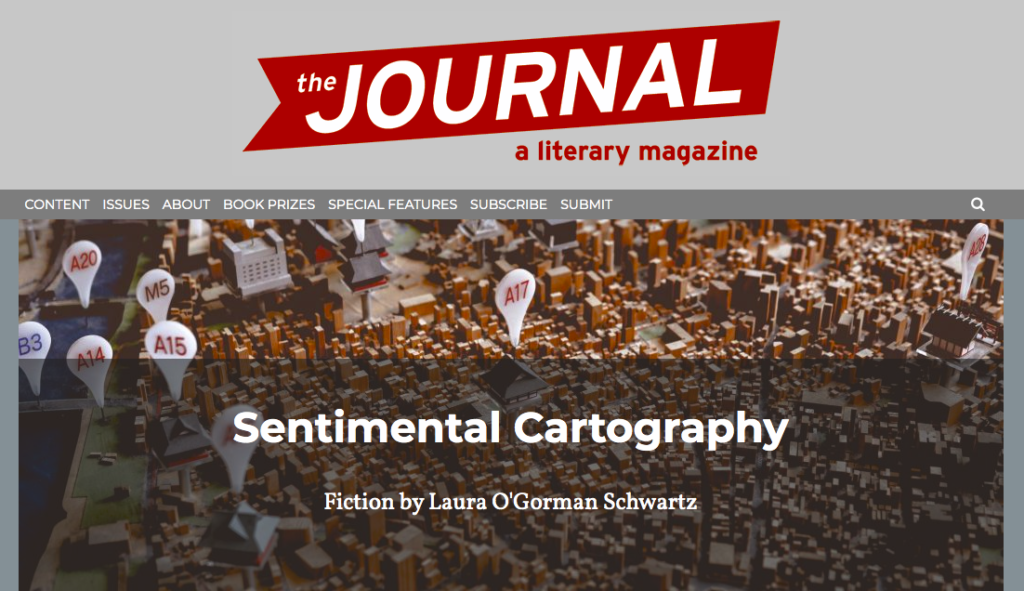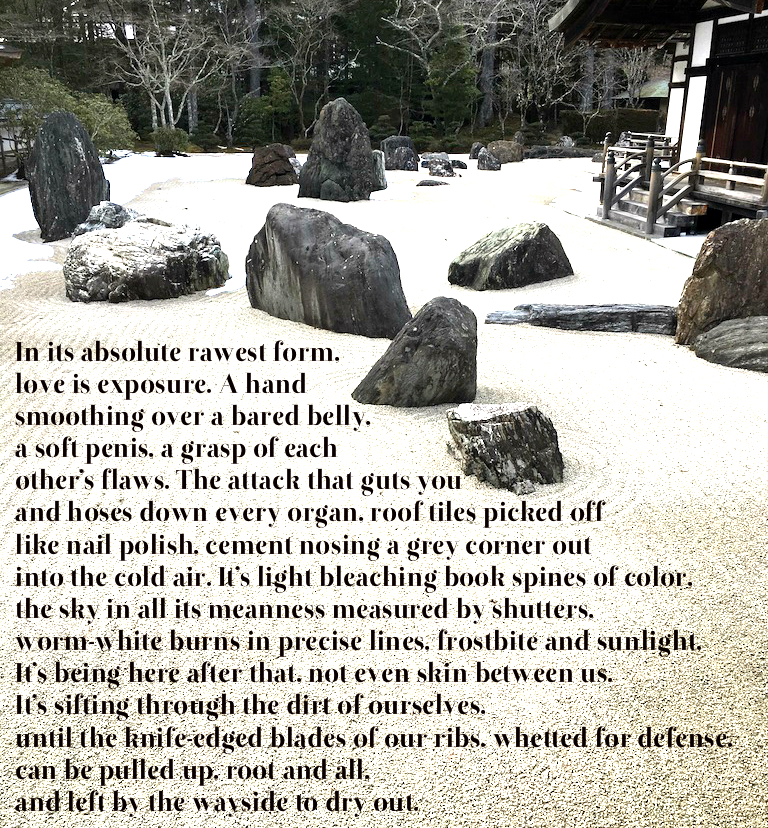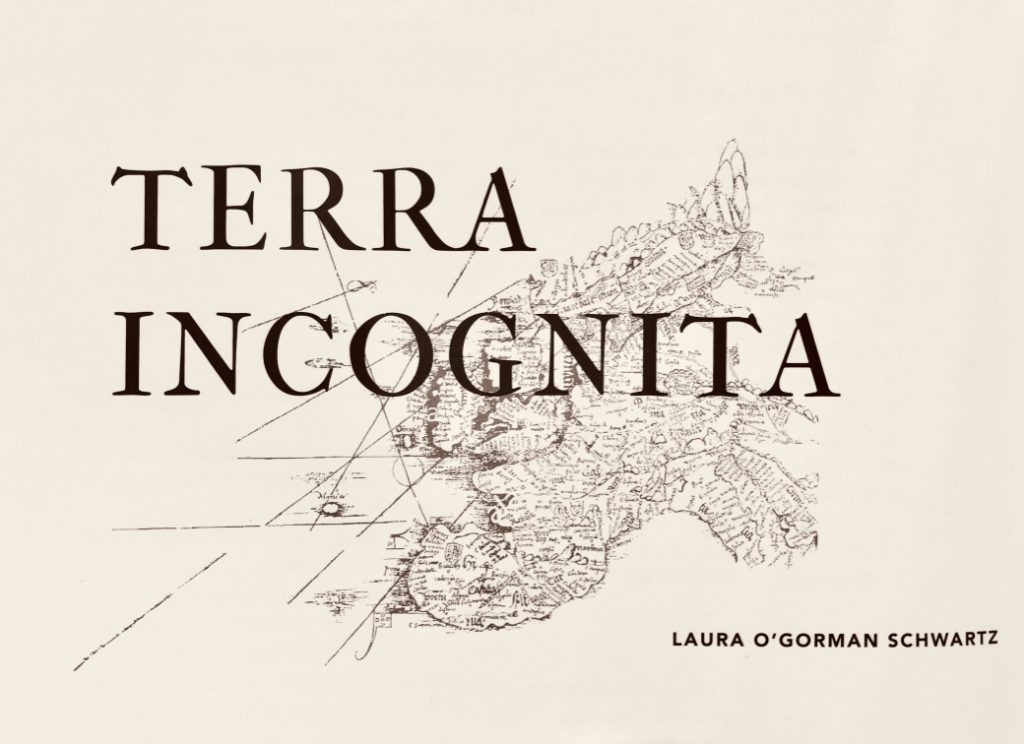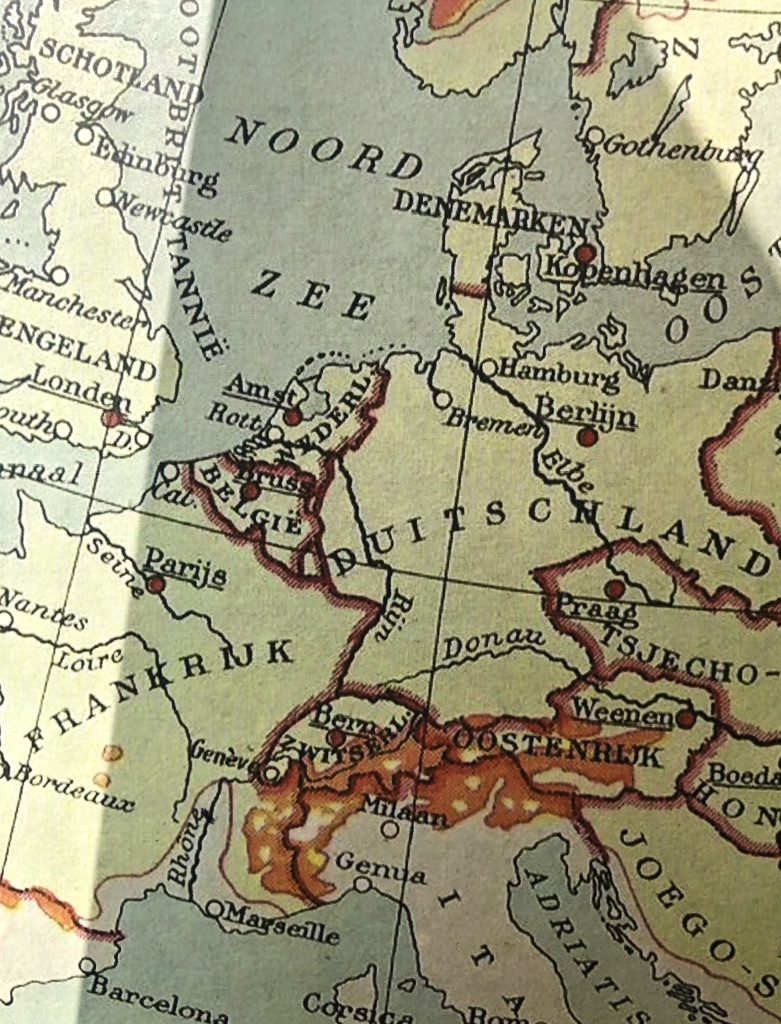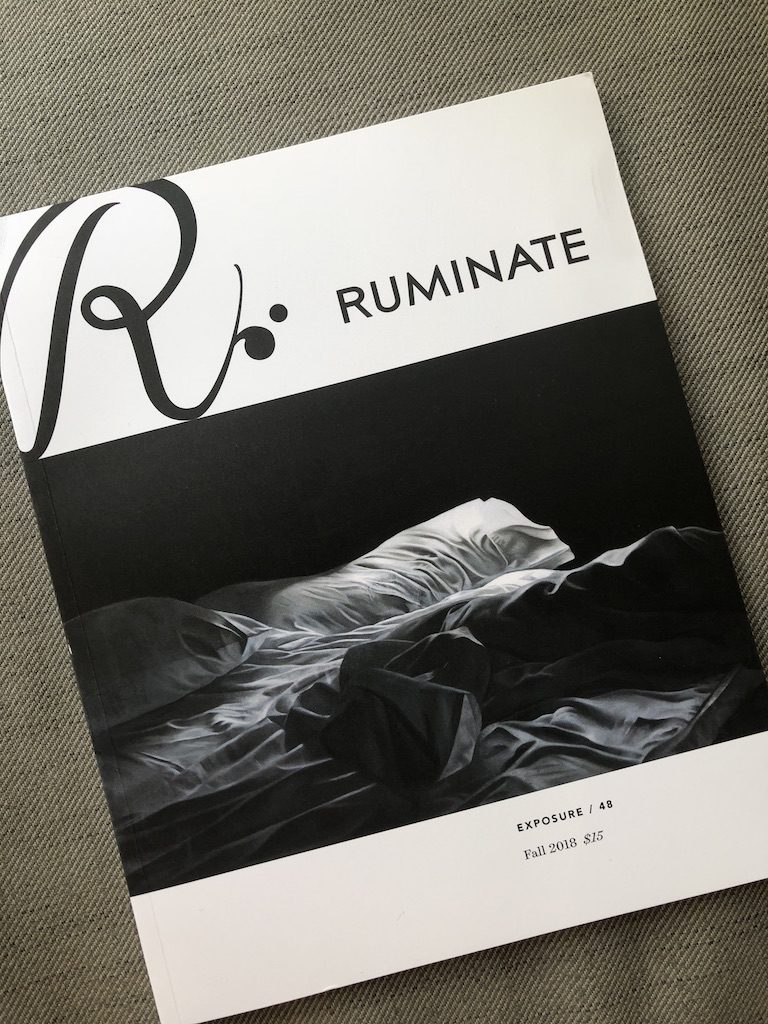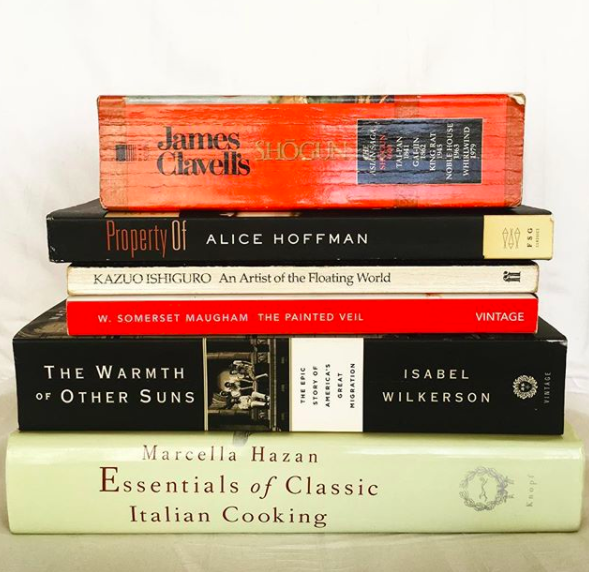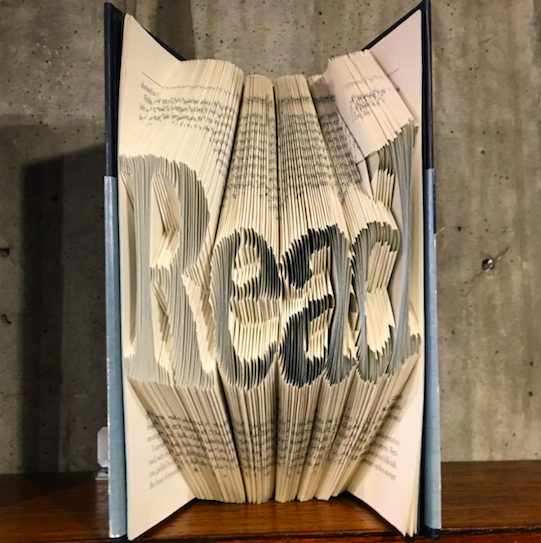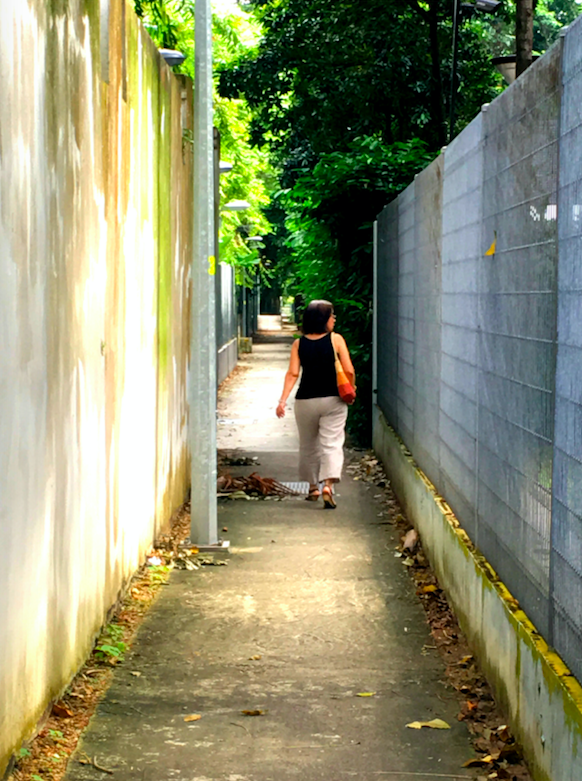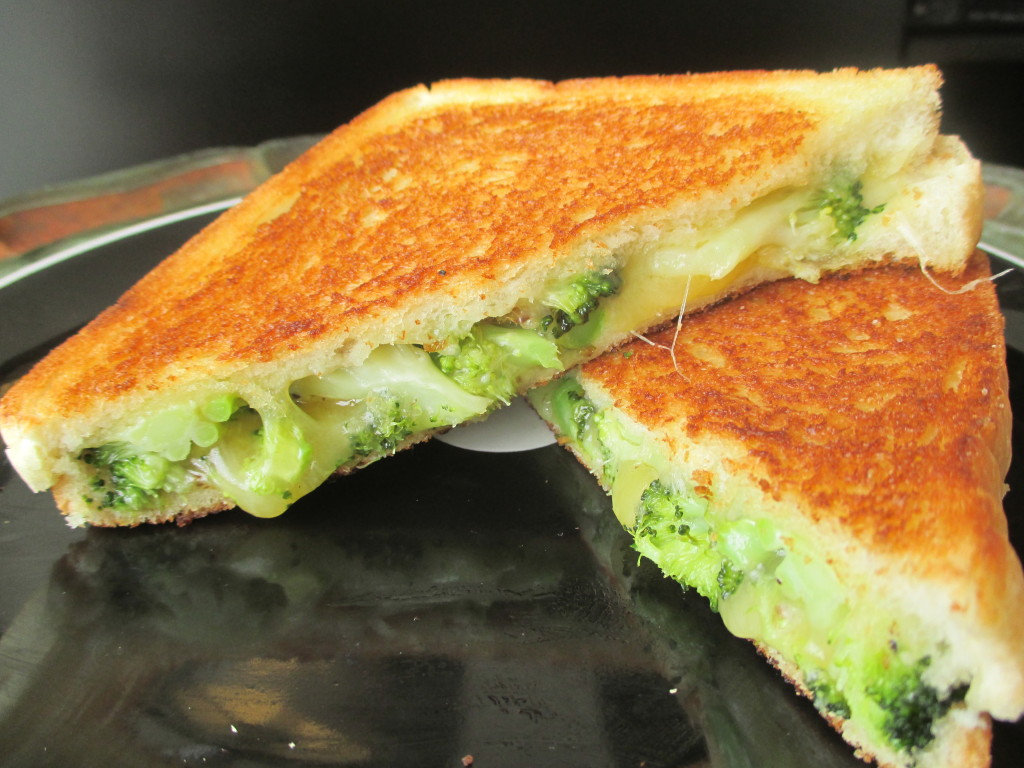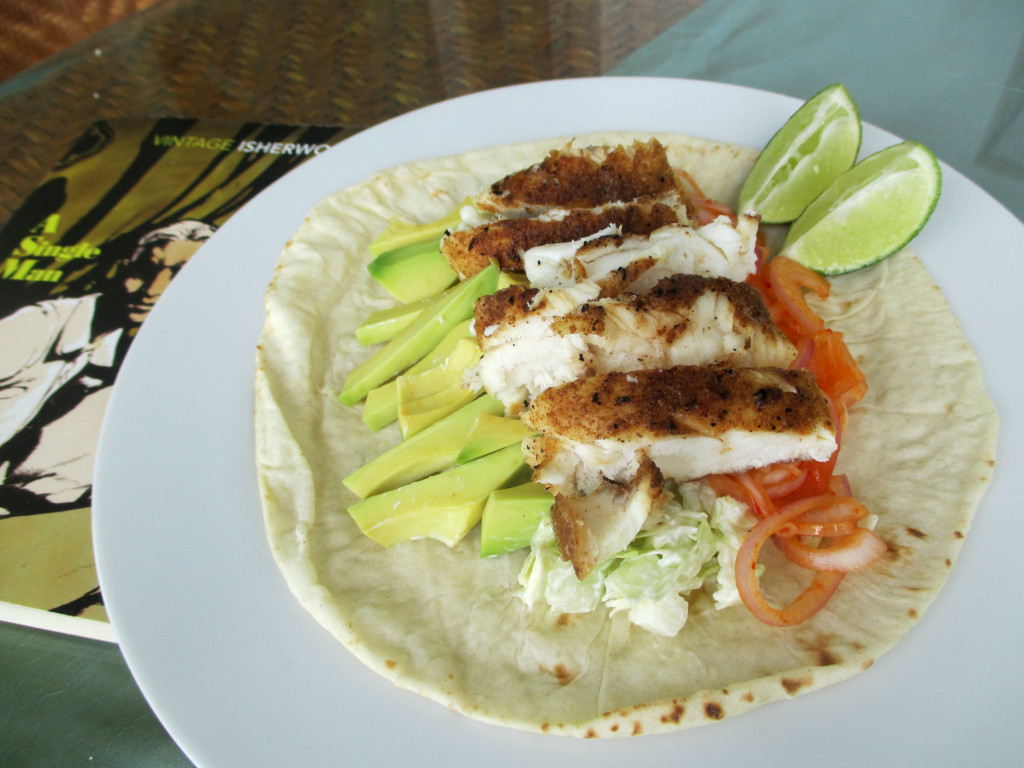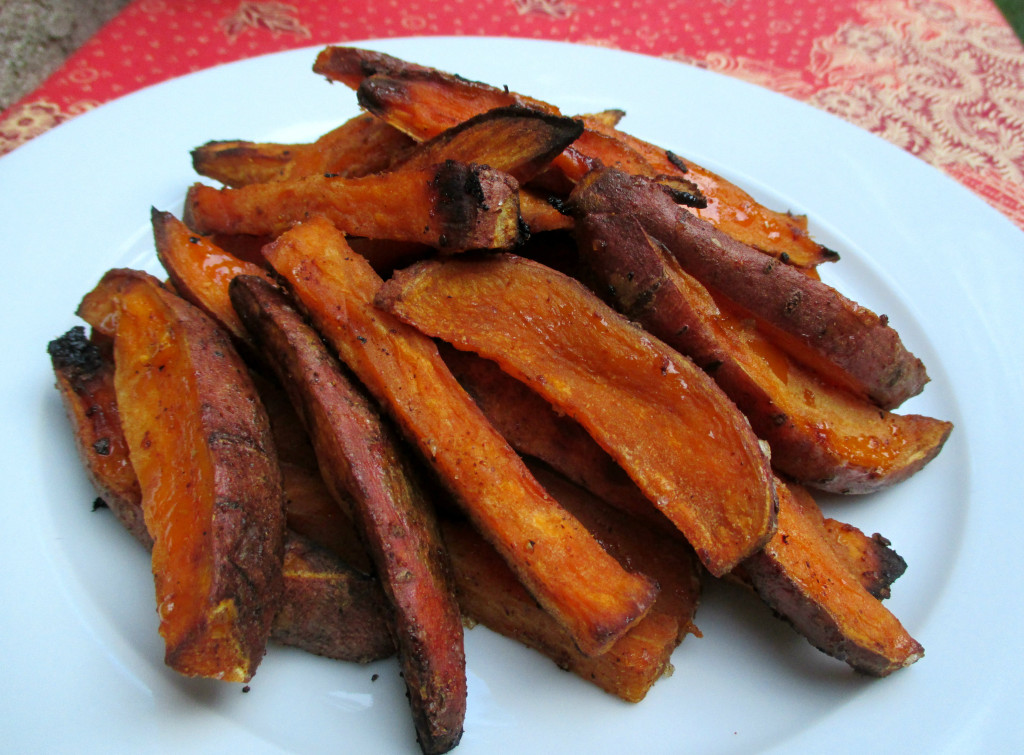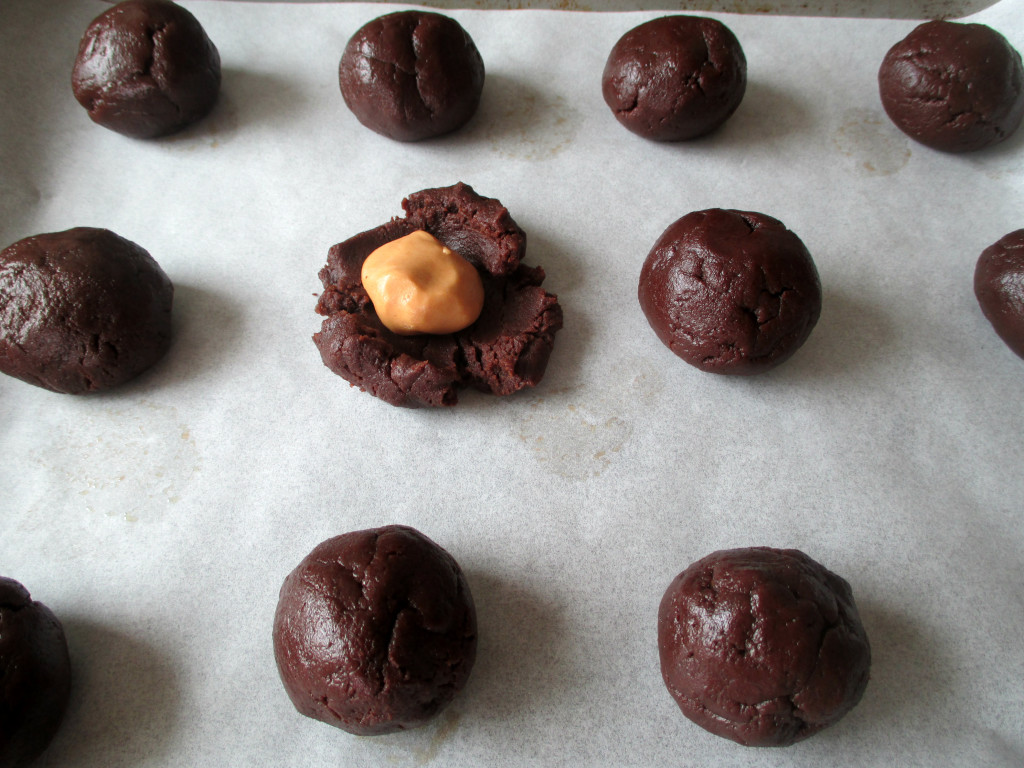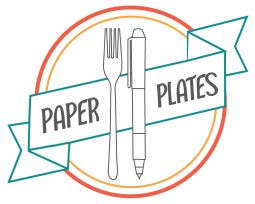Very excited that my short story Turpentine appears in the current issue of Wraparound South! Have a read:
Vermont, 1974
An audience, withdrawn from the eddying crowds, stood or shuffled in the stiff grass and soft dirt. Summer in Woodstock never got too hot, swaddled as it was in pine trees that combed the cool breezes. The tame heat of the July day unclenched, roping in a gray-gold dusk and a whistling little wind that scratched at the holes in the stage. No longer than a pick-up truck, it was barely more than a few wooden boards on metal poles screwed into place by Cal and the rest of the boys back in May. The real sturdiness had been saved for the inner stage, hidden by the canvas tent and guarded by cartoon women, paint cracking on bare stomachs and bikini tops.
The stage moaned and creaked, but Cal figured the speakers would swallow up the noise soon enough. He was stocky for a 17-year-old, his arms peppered with spots from the sun. He stood with the other hired hands, all teetering on the cusp of manhood and the edge of the crowd, wearing long hair and mustaches that didn’t quite fit yet. Obscuring German’s view from the ticket booth, they clustered together, ostensibly to nudge and josh one other, but really because it was harder to be singled out this way. Cal cocked his head, put a bored look on his face. He couldn’t stand to be mistaken for a member of the goggling audience. German hurled out a scolding, fat lips still around his cut-rate cigarette, and made a few hard gestures. They moved back a step but bet on German staying put, which he did. He smoothed greasy dollar bills into wrung out piles, pinned them down with coins too dull to catch the light. His fingers, dirty with ink, fished in the tires of blue tickets. $2.00. $2.00. $2.00.
The music erupted like a cannon, sending a ripple through the onlookers. Jacko, their own Jimi Hendrix knock-off, sauntered onto the stage and cycled through his smooth sell, cajoling and joking into the microphone. His words crackled and fuzzed.
“Don’t bust no water pumps, alright? Okay. That’s right. Now look, fellas, this is gonna be the last outside appearance that the girls are gonna make before we start this show. You see, we have some of your friends and neighbors on the inside waiting for the show to begin and we can’t keep ‘em waitin’ much longer.”
Jacko’s wide collar, which had wilted in the heat, caught the breeze as he went through the usual gotta-be-18-no-babies-no-ladies respectable rules for the striptease, the burlesque, nothing terrifying or too sordid, just a fun time. His easy spiel wound down into a roll call. Cal felt one of the guys’ elbows glance off his arm and land in his ribs. He pushed back, eyes still on the stage.
“Erma, step out.”
Erma had been given a gauzy green get-up, an old one of Ginger’s, with a swoosh of fabric from her bellybutton to the floor, a flimsy curtain hiding promised goods. She twirled and plucked at it, flipping her dyed Farrah Fawcett do in a move she must have picked up from a movie. Her smile slid off, then flickered on again, bigger this time. The white make-up pancaked across the summits of her heavy breasts began to glisten, catching the yellow legion of lightbulbs drooling above her.
“Bet they’re bigger than Margie’s,” Cal said, pulling at his belt loop.
“No shit, dimwit.”
Out came Lily-Rose, whom they knew, and then Josie.
“Shit, how old is she?” Brian hissed in awe behind Cal’s shoulder.
The pink sequins made Josie—all sticks and freckles—look awfully teen pageant in Cal’s mind. The bulge in his jeans retreated a little. Her straw hair had been wrangled up into a ponytail with a scrunchy, tinfoil-like in its crumple and shine. She was sharp where Erma was plush, and she spun and posed with a mean, determined air. Her smile stayed painted in place, pink and white, a crescent moon above the rosy froth and ebb of her liquidy costume (also borrowed and a skosh too big).
“Margie, step out. The body!”
Cal saw Margie wrinkle her nose and try to hide it by playing cute. The smells drove her nuts: the hot dogs and fried dough, the hay and horseshit, and the summer stench of people, their fingers sticky from sugar and the grime of safety bars. She wiggled and a few onlookers hooted. Some commented to each other in low tones. Cal peered around at them all with dislike, wishing there was something in his appearance, some badge or way of standing, to show his kinship with the girls. Something that would make people stop and nod with respect.
“Now, fellas, when the girls leave this stage, they’re only gonna be wearing two things: just a pair of shoes on their feet and a big smile on their face. Go on, give ‘em a bit of walkin’ music. There ya go. Come on. Show time.”
The girls shook their shoulders, fluffed hair and peachy rolls bouncing, the loudspeaker a bit too close and a bit too loud. The sun dropped down, a quarter into a slot, and the girls lingered a few minutes longer before slinking into the tent, leaving Lily-Rose to walk in circles, her hips swinging in a bid to convince the hesitators near the “Girls Show” sign. It was always ‘girls’, even if one was going on 40 and her tits were really starting to sag and she likely wouldn’t be here next summer.
Lily-Rose had been around a while and the boys turned from her with accentuated ennui, subtly searching the others’ faces for the same.
“Not bad. Not great,” Sam said, scratching a nipple through a fraying Led Zeppelin t-shirt.
“Not as good as my Lulu,” Brian called over the noise of the crowd.
“Your Lulu.”
“Right?”
“She may not know she’s 100% mine but she will.”
“Wouldn’t mind giving it to Josie’s pink little pussy. Imagine being the first to rip her open.”
“Sure, a little pounce and push.”
“Would be easy enough with your tiny prick.”
“Bigger than yours. Could get any girl on that stage if I wanted to.”
“Bet I have her begging for it.”
“Like you and Margie,” they crowed at Cal, their breath banging into his cheeks and ears. “Your girl.”
“Not my girl!” He stammered. For despite her large breasts and full legs, Margie was over 35 and Cal was embarrassed.
German sent Paul, a towering black man, to scuttle them and they retreated to their posts: brooms and shovels, pulleys and ropes, light switches, and sponges long blackened and ragged from filth.
Didn’t matter the time of day. Even at high noon when the girls wore sunglasses for the teaser, the sun was never permitted entry into the Girls Show tent. It made its presence known in other ways, in tiny glimpses in the linings and the ballooning humidity. Shows started in the early afternoon, continued until early morning.
Erma now understood what Margie had meant when she said that the exhibition beforehand was worse than the inner show. Out there, people laughed, convinced themselves they would never be low enough to pay the entry even as the girls silently screamed, “But you will! You will!” There was the frowning, the ushering away of families. Old bearded men hoisted their grandsons up by their armpits so the girls could wink and blow kisses at the small, wide-eyed face as they tried not to think of the children they had, or had and lost, or never had. The married couples on double dates appeared after dinnertime, the husbands shaking their heads and smiling, pleased to have moved beyond smutty teenage indulgences and onto clean relations with their wives. Then they murmured plans for later into each other’s ears while those wives directed stone gazes anywhere but at the girls. Usually at their own sensible shoes, which the mud would ruin.
But in the smelly, womblike interior of the Girls Show tent, there was acknowledgement. The crassness had been agreed upon. The girls would be met halfway, no longer a sideshow but the entire point. Men came in alone, mustachioed, arms crossed, often still frowning, but with a paid ticket. Or they entered in packs of four, five, six—the high school boys just over the 18-year cut-off, safe in their numbers and hassling each other about sex. You done it? With who? How many times? Bullshit. Who hadn’t done it? Why not?
“Time to be cavewomen. Make ‘em think they can be cavemen,” Margie wheezed in the stuffy and dim dressing room, which was only the passage between the outside stage and the inside one. It was a nothing space the girls used as a chrysalis, morphing from advertisements on the front stage—mere tempting gloss—to full bodies on the inner stage, stripped and solid.
“Good way of putting it,” Erma replied, sliding a finger under the straps digging into her shoulders.
She and the girls sipped bottles of beer through straws to preserve the magenta or scarlet or garnet. Lipstick wasn’t as cheap as it used to be. Prices kept inching up. Beer, warm as it was, made the time on stage whizz by, spread the memories of it into a jazzy blur. Like trying to remember the shapes of clouds while keeping afloat in salacious, white rapids. Buzzed and silly, she wasn’t there really. Erma heard the music, saw the lights, felt her back on the wooden planks pocked black from cigarette ash, heeled shoe pressed against a vertical beam.
Near the end of the 45 pop record, if Jacko gave the nod, the girl would choose one of the men leaning on his elbows over the lip of the stage, usually someone young and astounded, slink up and press her crotch towards his face, her knees coming to hover past his ears. Hairy hands would grip her thighs while she shifted to avoid a cramp and convinced them all she was enjoying herself. Sometimes she was.
Erma counted fifteen beats, her sight up in the pointed ceiling—all shadow, murky and safe. Then she placed her palm on his forehead, sweat meeting sweat, and pushed gently. His fingers dug in harder (sure to bruise, would have to powdered over for later shows), so she gave a theatrical shove, removed herself with a coy roll and hit a wobbly final pose a beat after the music fell off. The men cheered and smiled, pleased to have gotten their money’s worth along with a story to tell over work drinks on Monday.
Backstage was an orgy of rushing. The guzzles of water. The girl coming off sliding past the girl next on. The scrabble for matching tops and bottoms. Slick breasts and stomachs pressing into heads or arms reaching for cosmetics. The missing compacts. Mascara reapplied or wiped off. And some girls just trying to sit down for a moment, to light cigarettes and not to lose their flame in the shuffling by.
A carnival was all noise until it wasn’t. Somewhere before dawn (Cal wasn’t much for watches; they reminded him of his father), the trembling Ferris wheel and the hoarse Tilt-a-Whirl collapsed into silence and stillness. The crowds were replaced by worn tracks in the dirt, boot prints and litter. Balloons fell into rubber scraps in the dark. There was just the flapping of the flags—colorful by day, black teeth by night—and the trickles of conversation caught in puddles of orange light.
The greasy pink letters of EXOTIC glistened as Josie emerged from the tent, her knees red and her feet bare. She never did like the habit of shoes. Dawdling, she tilted her face up at the rolling piles of clouds, juicy-looking and icy white from the moon.
“Saw you boys divvying us up back there,” she said, accepting Cal’s half-smoked cigarette and noticing his fingers were smudged at the knuckles.
Cal meant for her to give it back but she didn’t, and he didn’t know how to ask.
“Boys nothing,” Erma said, letting the canvas flap close behind her. Her breasts had been re-holstered and shelved inside a sweater patterned with seagulls, their wings brushing her collarbone and gliding over her curves in a way that made Cal wish he had held onto his cigarette to offer it to her instead.
“Boys nothing,” she said again. “Didn’t you see that awful girl during the teaser? Right in the middle and by herself? First thing I saw when I stepped out.”
“Tried not to look too close at them all up front,” Josie said, catching falling ash in her palm before tipping it to the ground.
“She was all pinched in, falling socks and unwashed hair. Coulda just killed her, aiming those slitty eyes at me. Can guess what was galloping through her mind. ‘My panties may be dirty but at least they’re on.’”
Erma caught her breath.
“Don’t mind them, Erma,” Josie murmured.
“You feel all that?” Cal asked with wonder, his eyes tracing the thin lines of anger roosting around Erma’s mouth.
Cal hadn’t heard the other girls talk this way, never heard them do more than snarl at the day. Most of them had sealed shells like Josie, only letting in the occasional peep or shooting out the occasional barb. Even when Margie had let him into her cot and bullied him into pleasuring her properly before letting him stick it in, she never talked too much in the past tense. Cal realized he had learned to do the same since he arrived over a year ago.
He gave Erma a small smile, a real one. Out of her make-up, she couldn’t be called pretty; more handsome. Big sister-ish, but your best friend’s big sister, so there was a charm there, a cozy type of sexiness. Josie saw the soppy infatuation in the smile, steeping like a cheap teabag in cool water. She snorted and threw Cal’s unfinished cigarette into the grass, where it sent up threads of smoke. They watched her beeline for the girls’ sleeping tent.
“Josie doesn’t like boys too much, huh?” Cal said, his unsure hands finally settling in his front pockets.
“They’ve been rough with her. Always had the three older brothers tussling, chasing her around, giving her Indian burns and plummy bruises.”
“Daddy stripped her down before whipping her? That sorta thing?”
Erma’s eyes, an old brown, fixed on the tent flap where Josie had slipped out of sight.
“Your daddy do that?” She asked.
“Often as he could.”
“You sound too moneyed for that.”
Cal grit his teeth and looked away.
“No amount of cash can fix a primo jerk. He tattered up my step-mom for years ‘til she finally snapped. Booked it back to Colorado three months ago.”
“My daddy never laid a finger on me. Spoiled and petted me ‘til I was rotten as my teeth. Hardest time in my life, the spring he died.”
Cal had a thought and strained to examine it: Women were good at appearing to give you an awful lot. They opened their legs, sometimes even just for him. They could make you feel real lucky, let you touch the innermost part of them, and still not really give you anything of themselves. Only a weeny memory she could whisk away with a neat and straightforward denial. She could make you strangers again with a snap of her fingers. She could throw every layer of clothing at your feet, and while you bask in her marvelous nakedness, for her it’s as routine and impersonal as the jokes a train conductor makes as he moves through cars collecting tickets. But Erma tipping out her past and her feelings was intimate. To tell the spiteful world to its face that it had hurt you, now that was a real thing.
“It’s rad that you talk, you know? I could get a big crush on you,” Cal confessed, feeling boyish and daring.
“I don’t doubt it, kid. But I figured it wouldn’t take much.”
Erma knew an overripe heart when she saw one, purpling and full and stretching out to her. Her daddy’s gave out on him, seized and stopped in the middle of his evening coffee in an April so wet the walls sent the windows groaning in their frames. Mud got into the pipes. Flowers drowned before they were born. The cemetery was a terror.
Not much wonder she married a neighbor boy two years older than her, who was tan with door-to-door sales and stuffed with a heart liable to gush with too hard a squeeze. Like her father, he was too gentle with her, as though her full figure was thin china. Her husband’s kisses were as tenderly placed as playing cards on a tower. The lamps in their bedroom were kept off so often, she kidded to her friends that she couldn’t recall the color of the pillowcases. In the dark, he would crouch over her on all fours, worried of resting too much weight on her, and stroke feathery, tickly touches up her chest and arms. Then, a timid entrance, a weak burble that would never plant a thing in her, and if she even sighed too loudly, he would rear up and out of her, begging to know what was wrong, he was sorry, had he hurt her.
Josie had laughed at that, Erma remembered, but there had been a low finish of wistfulness. Josie had skipped senior year of high school to get hitched to a chubby-cheeked, soft-voiced mechanic from one town over. He had whimpered fine promises in the garage as her head bobbed in his lap, under his hand. She had figured him a safe bet after all those boys who had yanked her about in cars in the school parking lot. But she discovered that she couldn’t have kids and he took a wrench to her, and that was that. Back to where she was, but with a fractured shoulder, an annulled marriage certificate, and a toxic cascade of sneers and pity hosing down the sidewalk around her feet.
“I’m not really like those other guys,” Cal blurted out.
“You’re young and might not know, but men say that an awful lot to girls,” Erma replied, eyes unfocused.
Cal’s mouth twisted and his hands burrowed deeper into his jeans pockets.
“Still,” he said. “I wasn’t divvying you up at least.”
“You were watching us real close.”
“Watching people on a stage isn’t a crime.”
She studied him for a few long seconds. He fidgeted, wishing he could take that last sentence back.
“I suppose it ain’t.”
Just as he made up his mind to try and put an arm around her, she said good night. But instead of following Josie’s route to a cot in the sleeping tent, she ducked back inside the dressing room. With a pull of a knob on a string, one of the bare bulbs shuddered into life. Erma thought again of that girl in the crowd out front, who had stood alone, arms crossed, sour mouth ossified, her face filling with the evening light.
“Know exactly what it was: At least I’m not you. At least I’m not you,” Erma said to herself, poking around the heaps of fabric until she felt the familiar corners of a cigarette pack.
Tears drizzled from her eyes but she paid them no attention. She sat in one of a pair of fold-out chairs, the bulky fuse box leering overhead, and struck a match. The metal of the seat was cold and the paint flaked under her touch, revealing rust.
Two cigarettes later, Josie found her. Erma’s gaze was hooked into something Josie couldn’t see, but she could guess well enough.
“I told you don’t mind,” Josie said, words snapping like branches.
“She was just…poor. She was poor and dirty and she thought—she knew—she was better than us.”
“Probably just some prissy farmer’s daughter, dumb as a rock unless you’re talking about how cows shit.”
“But that’s what I mean! To have that kind of stupid filth thinking it has a right to look down on…” Erma’s hand covered her own mouth with a firm grip, Barbie-pink press-ons against her cheek.
“Damn, Erma,” Josie said, exasperated. “What d’you think this was gonna be like?”
“No…I…I know.”
“You’re acting like a daddy’s girl again, looking at me with those big wet eyes, hoping someone else’ll make the world just what you want. We’re not going back.”
“No. Of course not.”
“So?”
Erma pulled in air through her damp nostrils and let Josie stub out her cigarette on the floor. Josie cupped Erma’s chin and leaned in. The kiss was pushy and caring. It was the kiss Erma had left town for, discarding her house and husband after a single week of mulling it over. Though Erma cut a more maternal figure, it was Josie who did the holding, cradling Erma into her bony chest and petting her hair the way Erma normally did for her. The mental susurrus of not allowed, not allowed, not allowed faded as she inhaled the smell of Josie’s skin. Josie planted little bites on her ear and neck until Erma’s breasts were firm and sensitive in their cheap bra. They pressed into the flock of gulls and then Josie’s possessive fingers. Unlike the men’s greedy fistfuls, Josie’s stroking and opening of Erma’s yielding body was about making all of Erma hers, a responsible ownership.
“What you looking at, little boy?” Josie’s voice rang out, javelin thrown at the wide eyes of Cal, peering around the tent flap.
Erma’s red face dove into her palms as Josie leapt up, advancing like a foul-mouthed scarecrow on Cal, who vibrated in hesitation.
“Little sonuvabitch. Looking for a free show. Acting all nice so you can get a few decent screws later. Why don’t you—”
Cal stumbled away from the Girls Show tent, away from Josie’s blistering anger. The cool summer night trickled into his lungs. Worried she would come after him, he began to lope through the alleys between tents, his erection painful against his zipper.
Turning a corner, he found the unwelcome figure of Margie, smoking with a tremulous hand.
“Oh Cal, honey, you won’t believe. German just told me—”
“Jesus Christ, Margie. Not now,” he moaned, peeling her needy grip off his arm.
“…it’s my last summer. They’re turning me out September first.”
“Well, I’m sure you’ll find yourself a nice warm street corner somewhere. Now, just leave off!”
There was unbelievable hurt on her face, but all he saw was the flab of her cheeks, the puffiness of her eyes, the new wrinkles. She hiccupped, sobbed.
“Didn’t I tell you not now?” He demanded, turning away, his own eyes hot and threatening.
He marched out into the charcoal morning, chest squeezed, the taste of turpentine coating his mouth. Once, he had tried to spook the artist touching up the busty silhouettes on the truck and got a handful of the stuff winged at his face. That choking and stinging, he felt it now too.
END
Much obliged to Susan Meiselas, whose photography and recordings inspired this story.



